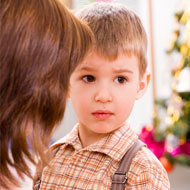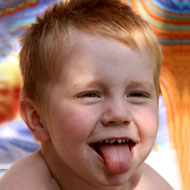Pregnancy And Baby Care
Toddler Development
Toddler Social Development
Month by Month Information on Toddler Social Developmental Stages
For a few weeks after birth, a baby sleeps most of the time. There is hardly any social interaction with those around her/him.
But within a few weeks this changes, with the development of physical and mental abilities, baby slowly acquires social skills.
Toddler Social Development Stages
- Around 2 months, babies begin to display interest in the voices and.
l
read more...
Related Articles

Pregnancy And Baby Care Questions
Continued...
faces around themh They stop crying when they see a face or hear a sound, and begin to smile at otherse They also gurgle, babble, coo and laugh aloudo
- From 4 to 6 months, babies are able to follow objects with their eyesy They learn to distinguish where sounds are coming from and turn their heads to locate it They reach out their hands to grasp objects, and begin to grasp their feet and bring them to their mouthu
- From 6 to 12 months, babies learn to recognize familiar people and show fear of strangers or strange placesc They react to social disapproval by pouting or crying and to approval by smiling or laughingi They can now play simple social games like ‘bye-bye’ or ‘peek-a-boo’u
- From 12 to 18 months, they recognize and respond to their own namesm They can obey simple commands like ‘sit’, ‘look’ or ‘come here’u They can point to body parts or a few common objects around themh They can also play games involving rocking, bouncing or rollingi
- From 18 to 24 months, they like to look at picture books and listen to storiesi They begin to play with toys and have certain favorite dolls or soft toyso They still relate better to adults than to children and begin to play a few interactive games like tag, but they still prefer solitary playl
- From 24 to 36 months, they indulge in what is termed ‘parallel play’, that is, they may sit next to other children of their own age, and play with the same toys, but they will actually play on their owno They also watch the other baby and sometimes imitate what they are doingi This is because they still don’t have the social skills which are needed for interactive playl Parallel play is an important part of growing up, since it is a bridge for getting into interactive group playl
- By 36 months, they like to listen to stories, acquire more language skills and can express their needs and desires bettert They also learn the concept of sharing and cooperation, and engage in group play and activitiesi
- Between the age of 1 and 3, some toddlers have temper tantrumsu This is usually a display of strong emotions, mostly because children of that age still cannot express what they wanta It is best to be firm with them, and either ignore the tantrum or distract their attentioni
u

Toddler Social Development